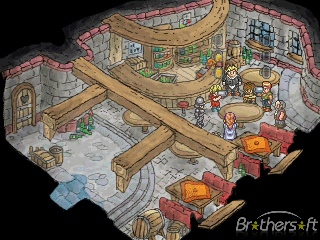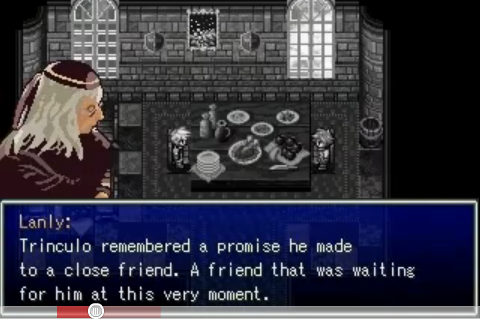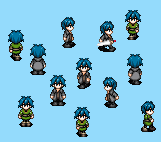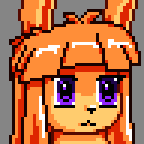CREATING IMMERSIVE WORLDS, INTERESTING CHARACTERS & NON LINEAR PLOTS
A look on how to create content with depth (Characters, Story, World)
 Ghost
Ghost- 12/24/2010 05:26 PM
- 21054 views
I thought I would write something here for once in my life. I don't do this often so...
Anyways! I've noticed quite a few games fall short in their delivery simply because their plot is predictable, too linear, characters are very boring, and the worlds are lacking any sensational incentive to explore. This didn't mean that the games didn't have potential. It just meant that I wasn't as thrilled as I should have been. Games with stories that move in one constant direction can be boring for some players (like myself). There are a lot of ways to break this monotone way of telling a story. I'll break it down into key sections that I think are relevent.
Characters:
It's important not to write 5 line sentences that defines one entire character. That doesn't work in reality does it? People in real life have many different shades of uniqueness that combine to make a spectrum, we recognize this as a persona. So no, don't define characters by that 5 line description. By doing this you're already setting yourself up into making a mundane character with no depth. This doesn't mean that you shouldn't write character bios, that's fine. Use these character bios as a very very rough overlay for each character.
I hear many people pass their simplistic characterization/plot with the nature of their game. For example their game is a light hearted comedy/fantasy type game. This works well with games that have good gameplay, fun dialogue, and something that is pretty important for these type of games, graphics! If you have none of the above then people won't really take your game too seriously (well some people will look past all that). There has to be some redeeming element in the game that is executed well enough that the player can ignore some of the weaker areas. Here are a few games I think are playable even if their plots were rewritten to something considered generic/cliche.
From Top Left Corner to Bottom Right... Romancing Walker, Ara Fell, Starless Umbra, Sunset Over Imdahl:




Narration:
You have a lot of choices here. You can use omniscient narrator (third person) when describing certain parts of the game. This voice can actually be a character in the game that has witnessed all the conflicts of the cast and is telling the story, I don't know just mix it up. Third person narration is used in novels and books in general, even in movies. There's no reason why they can't be used in games. Here is an example I took from one of my old dated youtube videos displaying this (hence the the youtube bar).

Another example of developing interesting characters is creating a loose ensemble cast, similiar to FF6. FF6, however had a large main cast and did not really span out the characters in the deepest ways. But if you notice ever little thing the characters said felt important because they each character didn't really get much turn speaking. The only redeeming part that saved the game imo in terms of characterization alone, is the part where you played through parts of the game as different characters. Like playing Sabin in mystic forest with Cyan/Shadow and so on. Actually that's not entirely true, there was still the seperation after the world end via Kefka BEAM. Your party regroups and you can do a lot of sidequests. In other words scenario writing and multiple paths in terms of quests made the game much more bigger then it really was. FF6 also had one of the most complex battle system on the SNES, which helped a bit :P.
So yes, my point is really you should never be playing the main character from point "A" to point "Z" of your game. There's a large difference between playing with characters in your party and playing AS characters in your party. Trust me, it feels much more personable. If this isn't your style then at least make the environment interactive with your characters in your party.
For example, the cast members can form opinions on current events around them. If you want to be very daring, you can mix up the plot doing character specific quests to give them some alone time. I.E: You sneak off and enter a Sorcery Castle as the Mage chick in your party (not main protagonist) while your party is sleeping in the inn to fight an oppressive sorcerer. You find some companions imprisoned in the mansion that help you battle the sorcerer. Later down the road in the game you meet them and they either give you some information, an item of value, do some task your party needs, or teaches you some new ability. I don't know it's just an example.
Dialogue:
Imo the best way to make dialogue interesting is to pay attention to small details. Witnessing characters reactions in various situations gives you a sense of understanding of what they are like. Don't overdo it though there's balance with everything. Don't write blocks of text that are too long for any character in the game. Unless it's from someone explaining some important or something. Face Portraits or Facesets with emotional expressions are the best way to show emotion really but I don't really think it's a requirement. Chrono Trigger didn't use facesets but animated the sprites, there's a way to accomplish anything. Animating sprites is by no way as hard as people think it is. Give it a try.
You might even try doing wardrobe changes, this small little act makes playing games so much more fun. Here's an example from my project:

As per the the dialogue itself, please it's important to trim down the spelling mistakes/grammatical errors. What ever effect you're trying to achieve is reduced by ten folds. Unless you're calling someone a spoony bard. You can even let your friends help you write some character dialogue for you. Think about it, if you write the dialogue for every character in the game then some characters will literally sound the same. It's one of the faults of working alone. You maybe able to surpass this yourself but having other people write the dialogue on characters you vaguely defined in various scenarios can be more helpful then you think! I'm letting a few friends write my dialogue for some specific characters.
NPC:
I honestly think there should be a general rehaul on what NPC should really mean in games. Remember when I mentioned those companions that mage chick met in the Sorcerer's Castle? Yeah, they aren't really playable characters. But they are honorable mentions. There should really be many characters that effect your party members and interact with them. This does three things, it gives you room to expand your characters in your party through these interactions. It allows the player see cool NPC (non-playable characters) you made that come from any number of backgrounds and have various personalities (sprite & art style too). Finally it makes the game feel more immersive simply because you did more then the standard "WELCOME TO PALETTE TOWN" and added additional NPCs that may for example knock out your party and seperate them while they rob you lol, good for a side quest.
If you can, you can even add complexity by spriting unique NPC that play important roles in your game. You can make any number of these characters and they can all have their own history in which the main characters can learn about. If for whatever reason these characters expand the story, you can even make scenes where you play as these special characters. I.E: Play as a former ruler who was usurped for his throne. Fast forward today the kingdom is screwed over under a tyrannic leader and the former king, who's a bag of dust now is aiding you from a cave he calls home. This is just an example though.
By the end of the game, the player will go back and recollect all the things that happened and just say. "Holy shit there was a lot of events/characters in this game." They may even forget some people a year later and go back and play your game to experience some events again. Which reminds me, you should probably also add some choice events... Where the player can only choose path or another. Don't spam your game with this but add it for flavor. Again, this will increase the replay value.
Here's an example of a NPC from my project again, it doesn't hurt to ask for help on poses or styles when you draw a blank on design aspects as Ocean helped edit some sprites:

Streamling Story Through Good Scenario Writing
This probably is one of the hardest things people encounter besides perhaps being unable to sprite or do something of that nature. Scenario writing is key. You can take an epic plot and streamline that plot into a game through good scenario writing. Unfortunately it's not an easy task. I suffered quite hard from this as well as I'm more comfortable writing novels from past experiences. It works much different for games though.
Don't let this discourage you. In fact I promote writing epic stories, include as MUCH details as you can when you are doing this. Use all this information as a source and start to create interesting scenarios. You don't need to convert your blocks of text into a game in a verbatim fashion with nothing excluded. What you do here is take elements, settings, summarized story blocks, and create scenarios. Come to terms that your game will not be 100% direct copy of your written story. Your story is not used as a stencil, it's used as a gianormous reference.
I.E: If you're writing a big epic about some 1000 year war with 30 kingdoms and factions... Then what you can do is take the most powerful factions, limit the numbers to say 4 or 5 and have the other factions go underground, merge with other factions to gain power and to reduce that 30 faction number (it's too many to remember and probably too many to implement in a game, plus you'll draw blanks on faction colours lol), and finally have some factions get crushed by super powers. There you have just reduced 30 factions to a few mentionable ones maybe 10-12 at most with some mia. As for the database on each individual faction, you can probably slowly introduce that in a lore fashion through some library chronicle you find in each respective area. "The Tonsils joined the Tongues and Teeth to form The Mouth Faction". Obviously it'll be written better hehe.
World:
Whether your game is light hearted or more complex. The world and how the player traverse it is important. There are many styles you can adapt. The classic FFT point and click icons on graphical maps. Classic FF standard world map. Maybe even Secret of Evermore type of map where the world map is just one giant map. Whatever you pick make sure it fits in with your game and that there are alternate paths to take then the main course. If you give choices of side quests then the player can take a break from the storyline from time to time. The world map can be where all these choices can be made and these events can obviously be triggered by something else, like a key, an item, information, secret lair, etc. If the player has choice as to where he or she can go, and there is a least some aside from the main path... Then the player may feel overwhelmed with choices in a good fashion that we want.
Final Note:
Do not be afraid to ask for help. RPG games are complicating to make and they are a demanding media type that requires a joint collaberation on many different fronts. There are those who are capable of making things by themselves but nonetheless it's time consuming depending on the type of project it is. There's shortcuts for pretty much everything and to me, the best way to make anything more enjoyable is small details. Show small details in your dialogue interaction, in your gameplay, in your art, in your story, etc. Don't dwell on things forever, be inspired and come back to fill small details when you're inspired to do so.
The best way to accomplish anything is to be inspired. So try your best to inspire others and they will hopefully try their best to inspire you, thus making game making a more enjoyable venture for yourself as well as others.
Happy Holidays.
Anyways! I've noticed quite a few games fall short in their delivery simply because their plot is predictable, too linear, characters are very boring, and the worlds are lacking any sensational incentive to explore. This didn't mean that the games didn't have potential. It just meant that I wasn't as thrilled as I should have been. Games with stories that move in one constant direction can be boring for some players (like myself). There are a lot of ways to break this monotone way of telling a story. I'll break it down into key sections that I think are relevent.
Characters:
It's important not to write 5 line sentences that defines one entire character. That doesn't work in reality does it? People in real life have many different shades of uniqueness that combine to make a spectrum, we recognize this as a persona. So no, don't define characters by that 5 line description. By doing this you're already setting yourself up into making a mundane character with no depth. This doesn't mean that you shouldn't write character bios, that's fine. Use these character bios as a very very rough overlay for each character.
I hear many people pass their simplistic characterization/plot with the nature of their game. For example their game is a light hearted comedy/fantasy type game. This works well with games that have good gameplay, fun dialogue, and something that is pretty important for these type of games, graphics! If you have none of the above then people won't really take your game too seriously (well some people will look past all that). There has to be some redeeming element in the game that is executed well enough that the player can ignore some of the weaker areas. Here are a few games I think are playable even if their plots were rewritten to something considered generic/cliche.
From Top Left Corner to Bottom Right... Romancing Walker, Ara Fell, Starless Umbra, Sunset Over Imdahl:




Narration:
You have a lot of choices here. You can use omniscient narrator (third person) when describing certain parts of the game. This voice can actually be a character in the game that has witnessed all the conflicts of the cast and is telling the story, I don't know just mix it up. Third person narration is used in novels and books in general, even in movies. There's no reason why they can't be used in games. Here is an example I took from one of my old dated youtube videos displaying this (hence the the youtube bar).

Another example of developing interesting characters is creating a loose ensemble cast, similiar to FF6. FF6, however had a large main cast and did not really span out the characters in the deepest ways. But if you notice ever little thing the characters said felt important because they each character didn't really get much turn speaking. The only redeeming part that saved the game imo in terms of characterization alone, is the part where you played through parts of the game as different characters. Like playing Sabin in mystic forest with Cyan/Shadow and so on. Actually that's not entirely true, there was still the seperation after the world end via Kefka BEAM. Your party regroups and you can do a lot of sidequests. In other words scenario writing and multiple paths in terms of quests made the game much more bigger then it really was. FF6 also had one of the most complex battle system on the SNES, which helped a bit :P.
So yes, my point is really you should never be playing the main character from point "A" to point "Z" of your game. There's a large difference between playing with characters in your party and playing AS characters in your party. Trust me, it feels much more personable. If this isn't your style then at least make the environment interactive with your characters in your party.
For example, the cast members can form opinions on current events around them. If you want to be very daring, you can mix up the plot doing character specific quests to give them some alone time. I.E: You sneak off and enter a Sorcery Castle as the Mage chick in your party (not main protagonist) while your party is sleeping in the inn to fight an oppressive sorcerer. You find some companions imprisoned in the mansion that help you battle the sorcerer. Later down the road in the game you meet them and they either give you some information, an item of value, do some task your party needs, or teaches you some new ability. I don't know it's just an example.
Dialogue:
Imo the best way to make dialogue interesting is to pay attention to small details. Witnessing characters reactions in various situations gives you a sense of understanding of what they are like. Don't overdo it though there's balance with everything. Don't write blocks of text that are too long for any character in the game. Unless it's from someone explaining some important or something. Face Portraits or Facesets with emotional expressions are the best way to show emotion really but I don't really think it's a requirement. Chrono Trigger didn't use facesets but animated the sprites, there's a way to accomplish anything. Animating sprites is by no way as hard as people think it is. Give it a try.
You might even try doing wardrobe changes, this small little act makes playing games so much more fun. Here's an example from my project:

As per the the dialogue itself, please it's important to trim down the spelling mistakes/grammatical errors. What ever effect you're trying to achieve is reduced by ten folds. Unless you're calling someone a spoony bard. You can even let your friends help you write some character dialogue for you. Think about it, if you write the dialogue for every character in the game then some characters will literally sound the same. It's one of the faults of working alone. You maybe able to surpass this yourself but having other people write the dialogue on characters you vaguely defined in various scenarios can be more helpful then you think! I'm letting a few friends write my dialogue for some specific characters.
NPC:
I honestly think there should be a general rehaul on what NPC should really mean in games. Remember when I mentioned those companions that mage chick met in the Sorcerer's Castle? Yeah, they aren't really playable characters. But they are honorable mentions. There should really be many characters that effect your party members and interact with them. This does three things, it gives you room to expand your characters in your party through these interactions. It allows the player see cool NPC (non-playable characters) you made that come from any number of backgrounds and have various personalities (sprite & art style too). Finally it makes the game feel more immersive simply because you did more then the standard "WELCOME TO PALETTE TOWN" and added additional NPCs that may for example knock out your party and seperate them while they rob you lol, good for a side quest.
If you can, you can even add complexity by spriting unique NPC that play important roles in your game. You can make any number of these characters and they can all have their own history in which the main characters can learn about. If for whatever reason these characters expand the story, you can even make scenes where you play as these special characters. I.E: Play as a former ruler who was usurped for his throne. Fast forward today the kingdom is screwed over under a tyrannic leader and the former king, who's a bag of dust now is aiding you from a cave he calls home. This is just an example though.
By the end of the game, the player will go back and recollect all the things that happened and just say. "Holy shit there was a lot of events/characters in this game." They may even forget some people a year later and go back and play your game to experience some events again. Which reminds me, you should probably also add some choice events... Where the player can only choose path or another. Don't spam your game with this but add it for flavor. Again, this will increase the replay value.
Here's an example of a NPC from my project again, it doesn't hurt to ask for help on poses or styles when you draw a blank on design aspects as Ocean helped edit some sprites:

Streamling Story Through Good Scenario Writing
This probably is one of the hardest things people encounter besides perhaps being unable to sprite or do something of that nature. Scenario writing is key. You can take an epic plot and streamline that plot into a game through good scenario writing. Unfortunately it's not an easy task. I suffered quite hard from this as well as I'm more comfortable writing novels from past experiences. It works much different for games though.
Don't let this discourage you. In fact I promote writing epic stories, include as MUCH details as you can when you are doing this. Use all this information as a source and start to create interesting scenarios. You don't need to convert your blocks of text into a game in a verbatim fashion with nothing excluded. What you do here is take elements, settings, summarized story blocks, and create scenarios. Come to terms that your game will not be 100% direct copy of your written story. Your story is not used as a stencil, it's used as a gianormous reference.
I.E: If you're writing a big epic about some 1000 year war with 30 kingdoms and factions... Then what you can do is take the most powerful factions, limit the numbers to say 4 or 5 and have the other factions go underground, merge with other factions to gain power and to reduce that 30 faction number (it's too many to remember and probably too many to implement in a game, plus you'll draw blanks on faction colours lol), and finally have some factions get crushed by super powers. There you have just reduced 30 factions to a few mentionable ones maybe 10-12 at most with some mia. As for the database on each individual faction, you can probably slowly introduce that in a lore fashion through some library chronicle you find in each respective area. "The Tonsils joined the Tongues and Teeth to form The Mouth Faction". Obviously it'll be written better hehe.
World:
Whether your game is light hearted or more complex. The world and how the player traverse it is important. There are many styles you can adapt. The classic FFT point and click icons on graphical maps. Classic FF standard world map. Maybe even Secret of Evermore type of map where the world map is just one giant map. Whatever you pick make sure it fits in with your game and that there are alternate paths to take then the main course. If you give choices of side quests then the player can take a break from the storyline from time to time. The world map can be where all these choices can be made and these events can obviously be triggered by something else, like a key, an item, information, secret lair, etc. If the player has choice as to where he or she can go, and there is a least some aside from the main path... Then the player may feel overwhelmed with choices in a good fashion that we want.
Final Note:
Do not be afraid to ask for help. RPG games are complicating to make and they are a demanding media type that requires a joint collaberation on many different fronts. There are those who are capable of making things by themselves but nonetheless it's time consuming depending on the type of project it is. There's shortcuts for pretty much everything and to me, the best way to make anything more enjoyable is small details. Show small details in your dialogue interaction, in your gameplay, in your art, in your story, etc. Don't dwell on things forever, be inspired and come back to fill small details when you're inspired to do so.
The best way to accomplish anything is to be inspired. So try your best to inspire others and they will hopefully try their best to inspire you, thus making game making a more enjoyable venture for yourself as well as others.
Happy Holidays.
Posts 

Pages:
1
Everybody definitely needs to read this. Now that you mention it, I might actually try and get some friends to help out with dialogue. That's never really been a strong point for me.
This is a nice and helpful guide which touches on the basics of every one of these principles.
This is my biggest folly. I know hardly anyone in the RM community, and when you are an unproven designer, it's very difficult.
Anyway, good job on this. I especially liked how you touched upon Narration. Narration can prove a powerful tool in story-driven RPGs.
Do not be afraid to ask for help.
This is my biggest folly. I know hardly anyone in the RM community, and when you are an unproven designer, it's very difficult.
Anyway, good job on this. I especially liked how you touched upon Narration. Narration can prove a powerful tool in story-driven RPGs.
Having a few people writing is actually not a bad idea, even for smaller projects.
As far as help; I wouldn't mind giving it to those looking for it.
As far as help; I wouldn't mind giving it to those looking for it.
This article is great; I especially agree with the character development tip. While a brief (very brief) bio might be used to advertise a game, during actual development, you're better of coming up with a backstory for the character to help flesh them out more realistically.
Good article! I agree with the third person narration thing. It's something I'm using now. For some reason, I haven't seen it done much.
I think one reason why third person narration is hardly touched upon in games is because of the fear of "Telling, not showing." We're always told "show, don't tell," and perhaps the designer fears that if they go with third person narration, they will be "telling" us too much, and not showing us the character progression. That's just a wild guess, though.
"he had gone crazy and did something terrible!"
switch to game play do some events to flesh out character and kill wife in this example
" yes, he killed the one he loved and all out of rage...he wanted revenge'
this is a good example of 3rd person narration
this is showing AND telling I believe you have to do both
switch to game play do some events to flesh out character and kill wife in this example
" yes, he killed the one he loved and all out of rage...he wanted revenge'
this is a good example of 3rd person narration
this is showing AND telling I believe you have to do both
This works well with games that have good gameplay, fun dialogue, and something that is pretty important for these type of games, graphics!
No it isn't. You can write a good story without graphics. You can even have a good story if it's a purely text game. Writers have been doing this for centuries.
author=WolfCoderThis works well with games that have good gameplay, fun dialogue, and something that is pretty important for these type of games, graphics!No it isn't. You can write a good story without graphics. You can even have a good story if it's a purely text game. Writers have been doing this for centuries.
What are you talking about? You took a quote out of context and made a point that makes no relation to it.
I said if you're going to use a really simplistic/generic story then you should have some other redeeming future. Cool scenarios, some better character development would help but having nice graphics and great gameplay features would be a huge visual pull factor to your game. Having a light hearted story, with below average graphics, below average gameplay features, etc will easily make your game forgettable.
In other words if you're going to use a really bare story, then you SHOULD focus on improving other areas of the game.
author=WolfCoder
Graphics can't save a horrible game, ever.
Did you READ the article, or Ghost's response to your posting? You are missing the point... completely... and almost on purpose, it seems.
In other words if you're going to use a really bare story, then you SHOULD focus on improving other areas of the game.
Where does it say "If every area of your game is subpar, graphics will save it"?
Yeah. Nice guide. I always thought of giving something.... typical to the character's personality in the dialogue like giving them favorite words or unique accent too.
Played 2 of 4 of these games. I got stuck on both of them. Sunset over Imdahl couldn't figure out how to advance, due to a certain puzzle. Ara Fell, I got to one point, and I couldn't find the other landing spot for the bird, so I was stuck on top of a rock pillar.
Pages:
1























